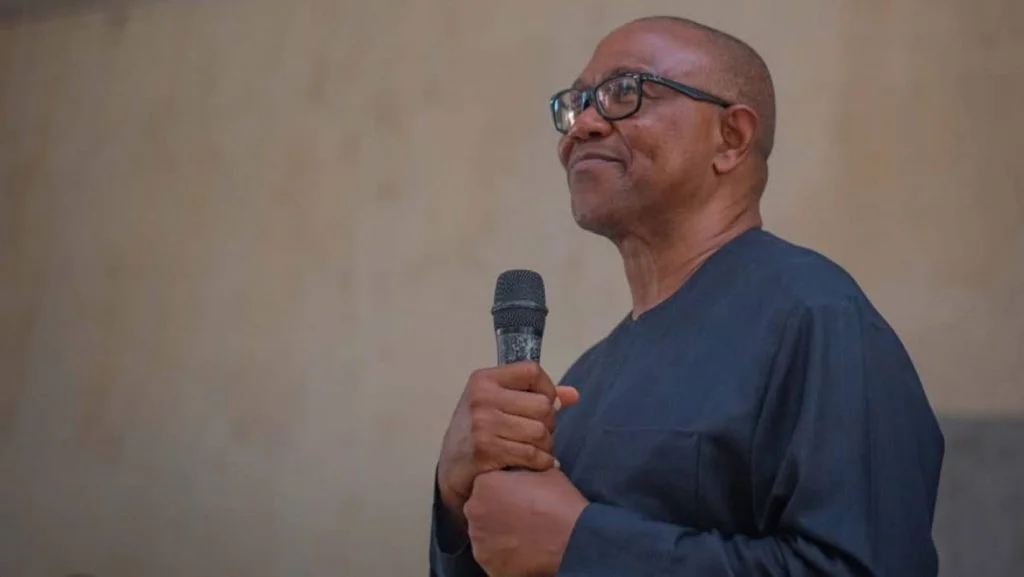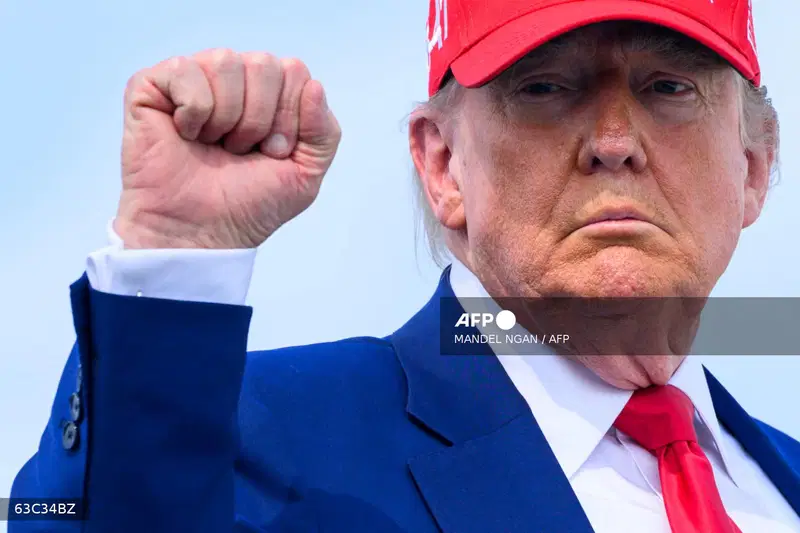Headline
Tinubu Is Obligated To Unveil His True Identity – Obi

The Presidential Candidate of the Labour Party, Mr. Peter Obi, has asked President Bola Tinubu, to mount the stage and address Nigerians on his true identity.
Obi said this during a press conference on Wednesday in Abuja, on the heels of Tinubu’s certificate from Chicago State University released to former Vice President Atiku Abubakar.
“Having followed the prolonged identity crisis that recently played out in the American Court System and the controversy surrounding the authenticity of the Chicago State University credentials of Chief Bola Ahmed Tinubu, I must confess that I am distressed as a Nigerian,” Obi said.
He said, “In addition to the barrage of media frenzy that the matter has triggered at home and abroad, I have had the unwholesome burden of responding to embarrassing questions about Nigeria’s overall credibility as a nation to privileged audiences and individuals both at home and abroad in different parts of the world where I have traveled lately.”
“To outsiders, the entire Chicago State University matter as well as Bola Ahmed Tinubu’s many other lingering identity question marks has further worsened Nigeria’s less-than-glorious image internationally.
READ ALSO: Pregnant Housewife Allegedly Kills Five-year-old Stepdaughter For Defecating
“Uninformed outsiders now see every other Nigerian as a potential fraudster, certain forger, or identity thief. The controversy is unnecessary just as the implicit global embarrassment could have been avoided.
“In my opinion, Chief Bola Tinubu should have saved the nation and himself from this protracted embarrassment and undue anxiety. Even this late in the day, however, Chief Bola Tinubu still owes the nation and the world a simple debt of obligation that only he can discharge. I call on him to immediately and personally mount the rostrum of his present high office to perform a simple task once and for all time.
“He should re-introduce himself to the nation he governs and to the world for the avoidance of further doubt. He should let the world know his name, nationality his place of birth, his parentage, the primary and secondary schools he attended with dates as well as the actual universities he attended and certificates obtained.
“He should indicate clearly where and when he did his National Youth Service. In addition, if at any time he has had a change of name, he should clearly state so and the circumstances. That, in itself, is no crime. This simple task should take no more than a few minutes. It requires no a+davits, prolonged court processes, spokespersons, agents, or surrogates. This task is one that only Chief Bola Tinubu himself through a direct personal statement can perform. He must perform this task urgently in order to lay to rest, once and for the last time, the many lingering doubts and valid speculations about his true identity.
READ ALSO: Head, Edo Security Network Remanded Over Alleged Murder, Others
“A leader cannot outsource a clear unambiguous personal statement about his identity to political surrogates, social spokespersons, lawyers, or any other persons no matter how highly placed. A matter of the personal identity of a leader is too sensitive and central to the functions of the office he currently occupies to be tried with, outsourced, or disguised under the cloak of officialdom.
“It is also about integrity, morality, values, and the rule of law that denies the character of the Nation and its people. In his present capacity as a leader of a nation of over 200 million Nigerians, his true identity is a matter of grave national and international interest.
“The people deserve to know for a certainty the true identity of their leader and this overrides whatever rights he may have to personal privacy. In addition, the international community deserves to know the true identity of the person with whom they will engage in Nigeria.
“Having stood for an election to the elevated public office of President of the Federal Republic of Nigeria, Chief Bola Tinubu has implicitly undertaken to cede the rights of a private citizen in favour of a life of open disclosure of his true identity, and other circumstances that may be of public interest. His personal integrity demands no less.
“The legitimacy of the office he currently occupies demands that much and even more. Respect for the integrity and esteem of the Nigerian nation within the community of nations makes it even more incumbent and compulsory. It is time to do the right thing.
“Long live the Federal Republic of Nigeria.”
Headline
U.S. Lawmaker Reacts To Nigeria, U.S. Airstrikes

United States Congressman, Riley Moore, has stated that President Donald Trump is determined to put an end to the killing of Christians in Nigeria, warning that further action may follow if the violence persists.
Moore made the statement on Friday via his official X handle.
According to the lawmaker, the strike represents the first step in addressing what he described as the ongoing slaughter of Christians and the broader security crisis affecting Nigerians across religious and ethnic lines.
READ ALSO:US Dept Of War Shares Video Of Air Strikes In Nigeria
“President Trump has been clear that the killing of Christians in Nigeria must end,” he said.
He that the administration’s resolve on the matter should not be underestimated.
“As I stated at the outset: Do not test President Trump‘s resolved in this matter.
READ ALSO:JUST IN: US Forces Bomb Terrorists Camps In Nigeria
“Tonight’s strike in coordination with the Nigerian government is just the first step to ending the slaughter of Christians and the security crisis affecting all Nigerians,” he said.
He stressed that the operation signals a stronger stance by the United States in support of Nigeria’s efforts to tackle terrorism and violent extremism, noting that further measures could be taken if the situation does not improve.
Headline
US Dept Of War Shares Video Of Air Strikes In Nigeria

A video footage of the US military air strikes in Nigeria has emerged.
The video was released by the US Department of War following its air strikes against terrorists in Sokoto.
Earlier, the US secretary of War, Pete Hegseth had confirmed that military air strikes hit terrorists in Nigerians, saying it was deadly.
Later on, the US. African Command, confirmed that it conducted the attacks described as very deadly by President Donald Trump.
Trump said he was only keeping the promise he made earlier last month to strike the terrorists he believes are killing innocent Christians.
READ ALSO:JUST IN: US Forces Bomb Terrorists Camps In Nigeria
Although described as powerful and deadly, the casualty caused by the attack is yet to be released.
Explaining further, security expert, Brant Philip, said the strikes may have been launched “from the USS Paul Ignatius, using a Tomahawk missile.”
The Nigerian government through its ministry of foreign affairs has also confirmed that the strikes were successful.
Watch video here
Headline
JUST IN: US Forces Bomb Terrorists Camps In Nigeria

United States President Donald Trump said US forces conducted deadly strikes against Islamic State terrorists in northwestern Nigeria, and vowed more attacks if the militants keep killing Christians.
“I have previously warned these Terrorists that if they did not stop the slaughtering of Christians, there would be hell to pay, and tonight, there was,” Trump posted on his Truth Social platform, adding that “the Department of War executed numerous perfect strikes.”
READ ALSO:JUST IN: Kano Lawmaker, Sarki Aliyu Daneji, Dies Hours After Colleague’s Passing
Trump stated that the Department of War “executed numerous perfect strikes, as only the United States is capable of doing. Under my leadership, our Country will not allow Radical Islamic Terrorism to prosper.”
The US president wished everyone Merry Christmas, “including the dead Terrorists, of which there will be many more if their slaughter of Christians continues.”
Details later.

 News4 days ago
News4 days agoPHOTOS: New Era In Furupagha-Ebijaw As Okpururu 1 Receives Staff Of Office

 News3 days ago
News3 days agoUBTH CMD Marks 120 Days In Office, Expresses Commitment To Providing Conducive Working Environment

 News4 days ago
News4 days agoOPINION: Gumi And His Terrorists

 News3 days ago
News3 days agoFIRS Confirms NIN As Tax ID

 News4 days ago
News4 days agoFG Declares Public Holidays For Christmas, New Year Celebrations

 Metro3 days ago
Metro3 days agoFintiri Pardons Man Sentenced To Death For ‘Killing Herdsman In Self-defence’, Others

 News4 days ago
News4 days agoOPINION: Christmas And A Motherless Child

 News3 days ago
News3 days agoOPINION: My Man Of The Season

 News2 days ago
News2 days agoJUST IN: Kano Lawmaker, Sarki Aliyu Daneji, Dies Hours After Colleague’s Passing

 News3 days ago
News3 days agoKWAM 1 Withdraws From Awujale Race, Ends Court Challenge






























